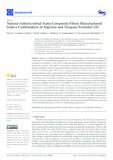JavaScript is disabled for your browser. Some features of this site may not work without it.
| dc.contributor.author | Lu, Hao | |
| dc.contributor.author | Butler, Jonathan A. | |
| dc.contributor.author | Britten, Nicole S. | |
| dc.contributor.author | Venkatraman, Prabhuraj D. | |
| dc.contributor.author | Rahatekar, Sameer S. | |
| dc.date.accessioned | 2021-08-18T16:12:50Z | |
| dc.date.available | 2021-08-18T16:12:50Z | |
| dc.date.issued | 2021-08-13 | |
| dc.identifier.citation | Lu H, Butler JA, Britten NS, et al., (2021) Natural antimicrobial nano composite fibres manufactured from a combination of alginate and oregano essential oil. Nanomaterials, Volume 11, Issue 8, August 2021, Article number 2062 | en_UK |
| dc.identifier.issn | 2079-4991 | |
| dc.identifier.uri | https://doi.org/10.3390/nano11082062 | |
| dc.identifier.uri | https://dspace.lib.cranfield.ac.uk/handle/1826/17021 | |
| dc.description.abstract | Alginate is a linear biodegradable polysaccharide polymer, which is bio-renewable and widely used for various biomedical applications. For the next generation of medical textiles, alginate nanofibres are desirable for their use in wound dressings that are biocompatible, sustainable, and abundantly available. This study has developed a unique manufacturing process for producing alginate nanofibres with exceptional antimicrobial properties of oregano essential oil (OEO) as a natural antimicrobial agent. OEO with varying degrees of concentration was incorporated in an aqueous alginate solution. Appropriate materials and electrospinning process parameter selection allowed us to manufacture alginate fibres with a range of diameters between 38 and 105 nm. A unique crosslinking process for alginate nanofibres using extended water soaking was developed. Mechanical characterisation using micro-mechanical testing of nonwoven electrospun alginate/oregano composite nanofibres revealed that it was durable. An extensive antimicrobial study was carried out on alginate/oregano composite nanofibres using a range of Gram-positive (methicillin-resistant Staphylococcus aureus (MRSA) and Listeria monocytogenes) and Gram-negative bacteria (Klebsiella pneumoniae and Salmonella enterica), which are common wound and food pathogens. The results indicated that increasing the concentration of OEO from 2 to 3 wt % showed improved antimicrobial activity against all pathogens, and activity was significantly improved against MRSA compared to a non-alginate-based control disk containing OEO. Therefore, our research suggests that all-natural alginate/oregano nanofibre composite textiles offer a new generation of medical textiles for advanced wound dressing technology as well as for food packaging applications. | en_UK |
| dc.language.iso | en | en_UK |
| dc.publisher | MDPI | en_UK |
| dc.rights | Attribution 4.0 International | * |
| dc.rights.uri | http://creativecommons.org/licenses/by/4.0/ | * |
| dc.subject | electrospinning | en_UK |
| dc.subject | nanofibres | en_UK |
| dc.subject | sodium alginate | en_UK |
| dc.subject | oregano oil | en_UK |
| dc.subject | antimicrobial resistance | en_UK |
| dc.title | Natural antimicrobial nano composite fibres manufactured from a combination of alginate and oregano essential oil | en_UK |
| dc.type | Article | en_UK |
Files in this item
The following license files are associated with this item:
This item appears in the following Collection(s)
-
Staff publications (SATM) [4450]

